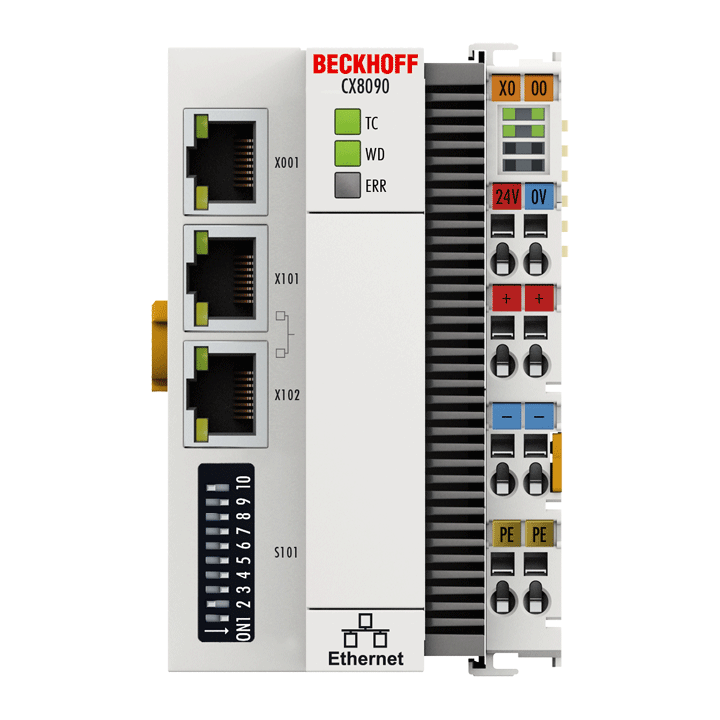The real-time jitter behavior depends on the used PC hardware. Laptops usually have higher jitter, because of energy saving concepts and graphic card integration. Industrial PCs like Beckhoff IPCs and alike have very low jitter. Applications that require up to 10 kHz bus cycle rates are no problem on this PCs.
TwinCAT 3 is delivered with a component-based setup that you can download from the Download section on the Beckhoff homepage.
The proven components of PC-based control: IPC, I/O, Motion and TwinCAT. The system-integrated solution for explosion protection requirements: PC-based control. With a universal toolkit of components and profound, cross-industry expertise, Beckhoff provides open automation systems for all industries on the basis of PC-based control technology. The package 'Beckhoff.TwinCAT.Ads.TcpRouter' implements a lean TCP ADS Router class to use on systems where no standard TwinCAT router is established or available. It is running in UserMode only (no realtime characteristics) and contains no further functionality than distributing the ADS Frames (e.g. No Port 10000, no ADS Secure).
TwinCAT 3 is installed by default in the directory C:TwinCAT3.x (x = TwinCAT-version number). Changing the installation path is not recommended.
The following setups are available for each new version of TwinCAT 3.1:
- TwinCAT 3.1 eXtended Automation Engineering (XAE) (full installation)
- TwinCAT 3.1 eXtended Automation Runtime (XAR)
- TwinCAT 3.1 Engineering Remote Manager
- TwinCAT 3.1 ADS
Full installation - TwinCAT 3.1 eXtended Automation Engineering (XAE)

The full installation of TwinCAT 3.1 contains various installation options that you can select during the installation:
- Full installation - TwinCAT 3.1 Engineering and Runtime (Complete option)
- Full installation - TwinCAT 3.1 Engineering (Custom option)
- Full installation - TwinCAT 3.1 Runtime (Custom option)
Installation option | Scope | Use |
|---|---|---|
Full installation - TwinCAT 3 Engineering and Runtime (Standard installation) | Installs the complete TwinCAT system on a single PC:
|
|
TwinCAT 3 Engineering full installation | Installs the TwinCAT 3 Engineering for the development computer |
|
Full installation - TwinCAT 3 Runtime | Installs the TwinCAT 3 Runtime for the control computer The TwinCAT 3 Runtime (XAR) is already pre-installed on many Beckhoff IPCs or can be ordered as an option. |
|

See also:
Installation of the TwinCAT 3 eXtended Automation Runtime (XAR)
This installation contains only the components that are needed for the TwinCAT 3 Runtime. The setup is thus much smaller than that for the full installation of TwinCAT 3.
Typical application for the setup:
- New installation or update of the TwinCAT 3 Runtime system on a target system.
Installation of the TwinCAT 3 Engineering Remote Manager
This installation contains only the engineering components of a TwinCAT 3 version and cannot be installed stand-alone. It always requires a newer full version of TwinCAT 3.1.
Typical application for the setup:
- Use of older TwinCAT 3 Engineering versions without several TwinCAT 3 versions being completely installed alongside one another. Following the installation, a TwinCAT 3 Engineering version is then available in the Remote Manager and can be selected before loading a project. This installer is thus always only provided for downloading with the subsequent TwinCAT version.
Installation of TwinCAT 3 ADS
This installation contains only the components necessary for the use of ADS. ADS (TwinCAT Automation Device Specification) is a medium-independent protocol for communication with/between TwinCAT components. ADS is normally installed automatically together with TwinCAT 3 XAE or TwinCAT 3 XAR.
Beckhoff Automation Training
Typical application for the setup:
- A separate HMI system (with no control function of its own) that exchanges its process data with a TwinCAT-based control computer via ADS.
See also:
Beckhoff KL2012 Digital Output Terminal
The Beckhoff KL2012 digital output terminal connects the binary control signals from the automation unit on to the actuators at the process level with electrical isolation. It handles different load currents, and its outputs are protected against overload and short-circuit. The Bus Terminal contains two channels that indicate their signal state by means of light emitting diodes.It is particularly suitable for space-saving use in control cabinets. The connection technology is optimised for single-ended inputs. All components have to use the same reference point as the KL2408. The power contacts are looped through. The outputs are supplied by the 24 V power contact.
Specification:
- Connection technology: 4-wire
- Number of outputs: 2
- Rated load voltage: 24V DC (-15 %/+20 %)
- Load type: ohmic, inductive, lamp load
- Max. output current: 0.5A (short-circuit-proof) per channel
- Short circuit current: < 2A
- Breaking energy: < 150mJ/channel
- Reverse voltage protection: –
- Electrical isolation: 500 V (K-bus/field potential)
- Current consumption power contacts: typ. 15 mA + load
- Current consumption K-bus: typ. 5 mA
- Bit width in the process image: 2 outputs
- Configuration: no address or configuration setting
- Weight: approx. 55 g
- Operating/storage temperature: 0…+55 °C/-25…+85 °C
- Relative humidity: 95 %, no condensation
- Vibration/shock resistance: conforms to EN 60068-2-6/EN 60068-2-27
- EMC immunity/emission: conforms to EN 61000-6-2/EN 61000-6-4
- Protect. class/installation pos.: IP 20/variable
- Pluggable wiring: for all KSxxxx Bus Terminals
- Approvals: CE, UL, Ex
Beckhoff Software
Download Manual
Show Other Products
